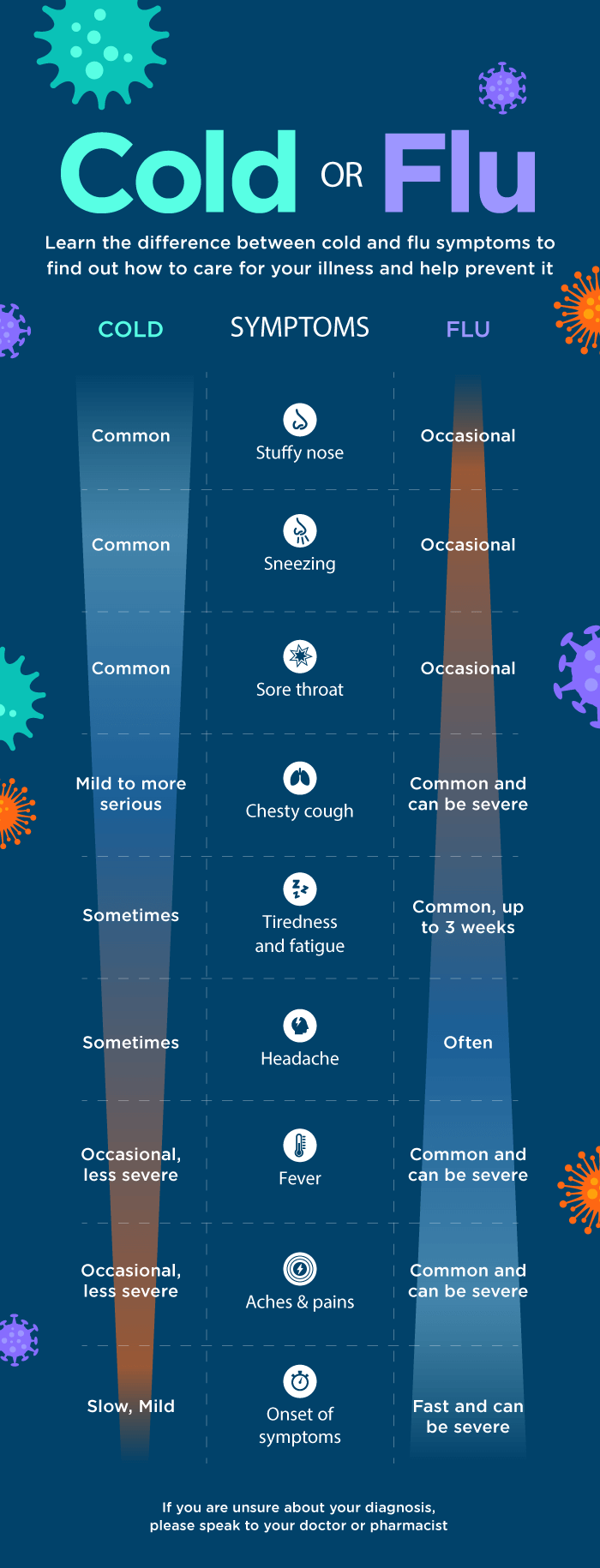Cold vs Flu: Symptoms and Treatment

Colds and flu viruses share a lot of common symptoms, and none of them are much fun. So, if you have a bad cold, you might think you have the flu – even if you don’t.
Both colds and flu are caused by viruses and cannot be treated with antibiotics,. But whether you have cold or flu symptoms, BENYLIN® can help give you some relief, so you can rest and recover.
In this guide, we’ll help you spot the differences between common cold vs flu symptoms – and show you how you can help manage your illness.
Cold or flu symptom checker
Sometimes, you might have such a bad cold, you think it must be the flu. It’s an easy mistake – colds and flu share many symptoms, including a sore throat and headaches. But as respiratory illnesses go, colds are far milder – and you might be out of action just for a few days, rather than a few weeks.
Symptoms, such as a sore throat, runny or blocked nose, and headaches alone, rarely mean you have flu. However, if you’re running a temperature, suffering from persistent headaches, or are experiencing frequent or severe bodily aches and pains, you may well have flu. If this is the case, you should rest until you feel better.
With our cold or flu symptom checker, you can keep an eye on those aches, coughs, and sore throats as they develop. It’s a useful way to figure out if you have cold or flu.
Cold symptoms
Colds often appear gradually. You’re likely to have a sore throat at first, followed by a blocked or runny nose. During the first three days, you’re very contagious – so it’s a good idea to stay home and avoid contact with others during this time.
By day four or five, you might develop a cough. Your symptoms should have cleared up within a week or two, though.
Here are a few common cold symptoms,:
A runny, stuffy, or blocked nose
Coughing
Sneezing
A sore throat
A high temperature (usually milder than with flu)
Occasional headaches
Slight muscle aches and pains
A feeling of pressure in your face and ears
A loss of smell and taste
Flu symptoms
Unlike colds, flu viruses often come on quickly and severely. You can expect fever, muscle aches, headaches, and a cough, along with many symptoms of a cold too. These symptoms can improve in two to five days, but you’re likely to feel worn out for a week or more.
Common flu symptoms include, :
A sudden high temperature (usually 38°C or more and lasting around three days)
Muscle aches and pains, which can be severe
A feeling of exhaustion, especially as the start of the illness
Headaches
A sore throat
Chest discomfort – which can be severe
Nausea or being sick
Loss of appetite, stomach pain, and diarrhoea
Problems with sleeping
Occasional stuffy nose and sneezing
Treatment options for cold or flu
Getting over the flu or a cold is largely a waiting game, but there are a few tips to help you manage your symptoms and feel better. These include, :
Get plenty of rest and sleep
Keep hydrated by drinking plenty of water
Soothe your sore throat by gargling salt water (not suitable for children)
Take ibuprofen/paracetamol to lower your temperature and reduce aches/pains
Stay home and avoid contact with others – this will stop you spreading the illness to others.
If you have a blocked nose, a pharmacist might be able to help with decongestant sprays and tablets. Similarly, they may recommend certain cold and flu medicines. Remember that cold and flu medicines often contain ibuprofen and paracetamol, so be careful not to exceed the recommended dose.
When to see a doctor
Please contact your GP for suspected Flu if:
You're worried about your baby's or child's symptoms
You're 65 or over
You're pregnant
You have a long-term medical condition – for example, diabetes or a condition that affects your heart, lungs, kidneys, brain or nerves
You have a weakened immune system – for example, because of chemotherapy or HIV
Your symptoms do not improve after 7 days
Please contact a GP for suspected cough if:
You've had a cough for more than 3 weeks (persistent cough)
Your cough is very bad or quickly gets worse – for example, you have a hacking cough or cannot stop coughing
You feel very unwell
You have chest pain
You're losing weight for no reason
The side of your neck feels swollen and painful (swollen glands)
You find it hard to breathe
You have a weakened immune system – for example, because of chemotherapy or diabetes
Seek immediate medical advice if you suddenly develop chest pains, have difficulty breathing, or cough up blood.
Prevent catching and spreading cold or flu
Nobody wants to catch or spread a cold to their family, friends, or colleagues. But taking a few simple precautions can help stop the virus from spreading:
Wash your hands regularly with warm, soapy water
Don’t share drinks, towels or other household items with someone who has a cold
Avoid touching your face if you come into contact with someone who has a cold
Catch germs in a tissue when coughing or sneezing – and throw them away as soon as you can
Stay home and limit contact with others when you’re not feeling well.
To prevent catching the flu, you should wash your hands regularly and avoid others who have been infected with the flu. But you should also consider getting the flu vaccine. The NHS offer this safe, effective measure once a year to those at risk. The best time to get it is in autumn before cold and flu viruses start spreading in winter.
